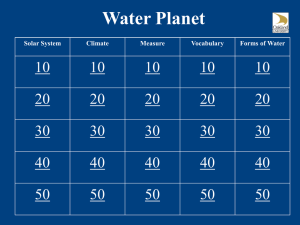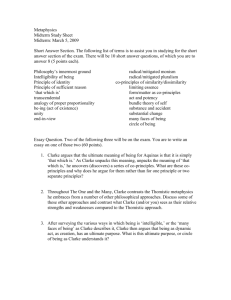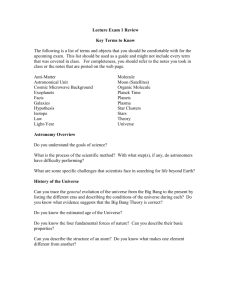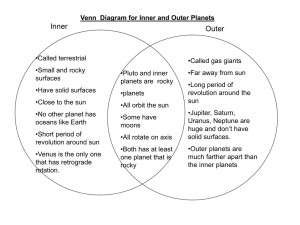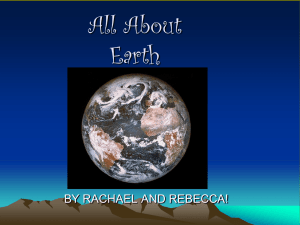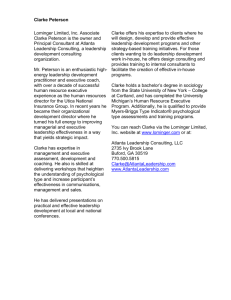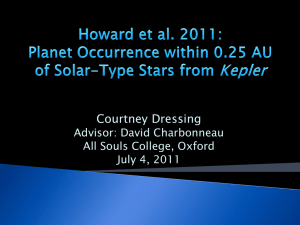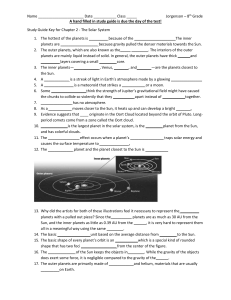The promise of space
advertisement
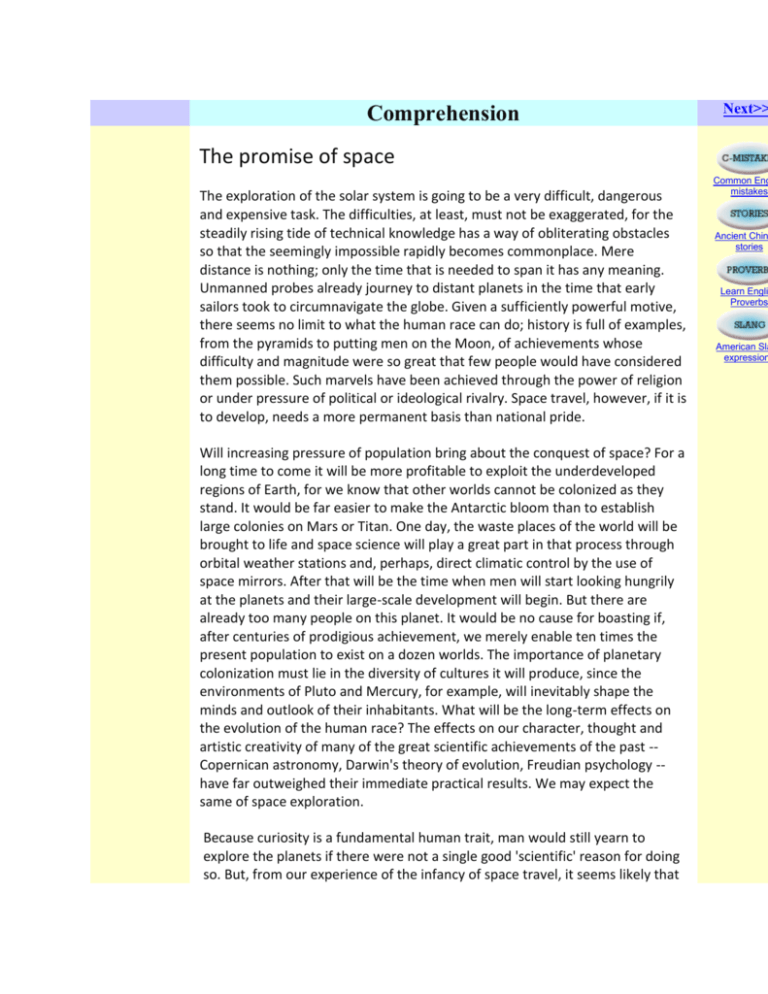
Comprehension Next>> The promise of space The exploration of the solar system is going to be a very difficult, dangerous and expensive task. The difficulties, at least, must not be exaggerated, for the steadily rising tide of technical knowledge has a way of obliterating obstacles so that the seemingly impossible rapidly becomes commonplace. Mere distance is nothing; only the time that is needed to span it has any meaning. Unmanned probes already journey to distant planets in the time that early sailors took to circumnavigate the globe. Given a sufficiently powerful motive, there seems no limit to what the human race can do; history is full of examples, from the pyramids to putting men on the Moon, of achievements whose difficulty and magnitude were so great that few people would have considered them possible. Such marvels have been achieved through the power of religion or under pressure of political or ideological rivalry. Space travel, however, if it is to develop, needs a more permanent basis than national pride. Will increasing pressure of population bring about the conquest of space? For a long time to come it will be more profitable to exploit the underdeveloped regions of Earth, for we know that other worlds cannot be colonized as they stand. It would be far easier to make the Antarctic bloom than to establish large colonies on Mars or Titan. One day, the waste places of the world will be brought to life and space science will play a great part in that process through orbital weather stations and, perhaps, direct climatic control by the use of space mirrors. After that will be the time when men will start looking hungrily at the planets and their large-scale development will begin. But there are already too many people on this planet. It would be no cause for boasting if, after centuries of prodigious achievement, we merely enable ten times the present population to exist on a dozen worlds. The importance of planetary colonization must lie in the diversity of cultures it will produce, since the environments of Pluto and Mercury, for example, will inevitably shape the minds and outlook of their inhabitants. What will be the long-term effects on the evolution of the human race? The effects on our character, thought and artistic creativity of many of the great scientific achievements of the past -Copernican astronomy, Darwin's theory of evolution, Freudian psychology -have far outweighed their immediate practical results. We may expect the same of space exploration. Because curiosity is a fundamental human trait, man would still yearn to explore the planets if there were not a single good 'scientific' reason for doing so. But, from our experience of the infancy of space travel, it seems likely that Common Eng mistakes Ancient Chin stories Learn Engli Proverbs American Sla expression astronautics will produce an expansion of scientific knowledge unparalleled in history. Many people dread the uses to which new knowledge and new technology may be put - in wars of annihilation or in the destruction of the environment. But surely it is ignorance and the narrow prejudiced outlook which accompanies it which is the real threat to our survival. It is not easy to see how the more extreme forms of nationalism or the more short-sighted aspects of the consumer society can long survive when men have seen the Earth as a pale crescent dwindling against the stars, until at last they look for it in vain. First by land across mountains, deserts and through impenetrable jungle, and then by sea in tiny fragile ships across trackless oceans, man has gradually explored and unified this planet. But the completion of the process, by means beyond the imagination of men before this century, is being achieved through the conquest of a third and totally alien element. The swiftness with which mankind has lifted its commerce and its warfare into the skies has surpassed the wildest dreams of our ancestors. Unknown lands have been opened up and the concept of a 'global village', with all that it implies about common standards and values, has begun to seem possible - indeed probable - as radio, television and other means of instant communication also use the airways to accelerate man's conquest of his native planet. But the victory is turning to ashes in our hands. Every previous age had its El Dorado -- its unknown land to conquer. It is a somber thought that as all possibility of expansion on Earth has practically ceased, the momentum of human culture must be exhausted in the foreseeable future. Civilization may endure for centuries, but will be inherently unstable. It may decay quietly and crumble into ruin, or it may disintegrate violently by internal conflicts. Space travel is a necessary - though not in itself sufficient -way of escape from this predicament. When Mars, Venus and the Moon become what the Americas were four hundred years ago, worlds of unknown danger, of infinite promise and opportunity, they will be the new frontiers of the human mind. It is fascinating, if premature, to try to imagine the future of space travel. In the footsteps of the first explorers will follow the scientists and engineers, shaping strange environments with technology as yet unborn. Later will come the colonists, laying the foundation of cultures which may in time be utterly unlike those of mother Earth. Over the first cities of mankind, the desert sands now lie centuries deep. Could the inhabitants of Ur or Babylon - once the wonders of the world - have pictured Tokyo or New York? Nor can we imagine the citadels our descendants may one day build beneath the blistering sun of Mercury or under the stars of the cold Plutonian wastes. And beyond the planets, though ages still ahead of us in time, lies the unknown and infinite promise of the stellar universe .... Questions 1.(a) What principal 'difficulty' of space travel does the writer dismiss ? On what grounds does he do so? (b) What 'powerful motive' does Clarke suggest lay behind the moon-landings ?Why does he dismiss this as a motive for future exploration of space ? 2. Why does Clarke believe that the need to solve the problem of overcrowding on Earth is neither a sensible nor a desirable motive for the conquest of space? 3.(a) '...man has gradually explored and unified this planet.' What does Clarke imply were the difficulties and dangers in doing this ? (b) What do you understand by the concept of a 'global village' and why does it now seem likely? 4. Choose three reasons that make it 'premature' to try to imagine the future of space travel. Number the reasons 1, 2 and 3. 5.(a) Explain the meanings of the following words as they are used in the passage. You may write your answer in one word or a short phrase. circumnavigate; diversity; outweighed; infancy; wildest (b) Use each of the following words as it is used in the passage in sentence of your own, clearly showing this meaning Your five sentences should not deal with the subject matter of the passage. obliterating; hungrily; fundamental; prejudiced; disintegrate 6. Why, according to Clarke, is space travel inevitable, and what may be its benefits to mankind ? Use relevant material from any part of the passage. Write about 150 words. Answers 1.(a) At present, space travel is inhibited by cost, hazard, and other seemingly insurmountable problems. However, such problems are overcome by technical advance. (b)Clarke suggests that the US moon landings were motivated by political rivalry with the USSR. He dismisses this motivation as temporary and inadequate. 2. He argues that space exploration with a view to colonization of other planets will not and should not begin until the full settlement potential of the earth has been exploited. Moreover, solving the problem of an ever increasing population is not merely logistical. It is a matter of creating cultural and artistic diversity in mankind itself as people adapt to the widely different climatic conditions of other worlds. 3.(a) Land exploration involved facing the cold and thin air of mountainous regions, the heat and aridity of desert areas, and the perils faced by the mariner as he sailed into the unknown in his vulnerable wooden ship. (b)Air travel and modern communications have made possible the transformation of a large number of separate cultures into a one-world community; the 'global village'. The concept implies the sinking of all national differences and hostilities and the kind of mutual co-operation which should characterize a village community. 4.1. The new environments will result from technologies so far undiscovered. 2. The social structures of the new settlements will differ from those of planet earth. 3. The architecture of these townships will need to be adapted to conditions so far not experienced. 5.(a) circumnavigate - sail round diversity - variety outweighed - exceeded in importance infancy - first ventures, beginnings wildest - most outrageous (b)An atomic bomb has a totally obliterating effect on its target. The thief looked hungrily at the diamonds displayed in the jeweler's window. The satisfaction of hunger is a fundamental human need. I am strongly prejudiced against anyone who harms children. The rocket was fired, and the plane disintegrated in front of my eyes. 6.Clarke advances three arguments supporting the inevitability of space travel. First, progressively developing technology removes seemingly insurmountable obstacles. second, when earth's full spatial potential has been exhausted, and to avoid destructive rivalries, an increasing population will force man to seek to colonize first the planets then the start. Third, man has an insatiable curiosity, which goes beyond the need to research for practical benefit. Clarke sees the benefits in the creation of new planetary cultures relevant to alien conditions, not as places of easement for world over-population. The science of astronautics will enhance technology through its own development. Earthly preoccupation with nationalism and consumerism will disappear. Air travel and media development already move towards a one-world concept. When human endeavor on planet earth loses momentum, space travel will offer new frontiers to the human mind; first the planets, then the stars. ( 143 words ) FURTHER READING COMPREHENSION LINKS 001 002 003 004 005 006 007 008 009 010 011 012 013 014 015 016 017 018 019 020 021 022 023 024 025 026 027 028 029 030 031 032 033 034 035 036 037 038 039 040 041 042 043 044 045 046 047 048 049 050 051 052 053 054 055 056 057 058 059 060 061 062 063 064 065 066 067 068 069 070 071 072 073 074 075 076 077 078 079 080 081 082 083 084 085 086 087 088 089 090 091 092 093 094 095 096 097 098 099 100 101 102 103 104 105 106 107 108 109 110 111 112 113 114 115 116 117 118 119 120 121 122 123 124 125 126 127 128 129 130 131 132 133 134 135 136 137 138 139 140 141 142 143 144 145 146 147 148 149 150 151 152 153 154 155 156 157 158 159 160 161 162 163 164 165 166 167 168 169 170 171 172 173 174 175 176 177 178 179 180 181 182 183 184 185 186 187 188 189 190 191 192 193 194 195 196 197 198 199 200 201 202 203 204 205 206 207 208 209 210 211 212 213 214 215 216 217 218 219 220 221 222 223 224 225 226 227 228 229 230 231 232 233 234 235 236 237 238 239 240 241 242 243 244 245 246 247 248 249 250 251 252 253 254 255 256 257 258 259 260 261 262 263 264 265 266 267 268 269 270 271 272 273 274 275 276 277 278 279 280 281 282 283 284 285 286 287 288 289 290 291 292 293 294 295 296 297 298 299 300 301 302 303 304 305 306 307 308 309 310 311 312 313 314 315 316 317 318 319 320 321 322 323 324 325 326 327 328 329 330 331 332 333 334 335 336 337 338 English improvement ESL podcast Learn Chinese the easy way _s-xclick -----BEGIN PKCS7
